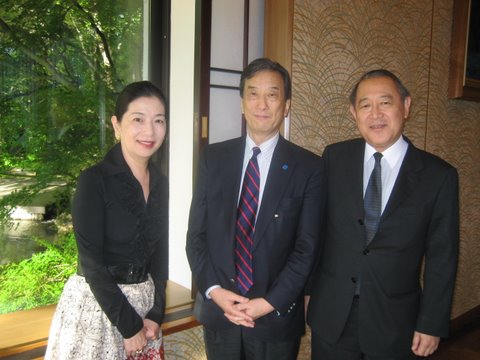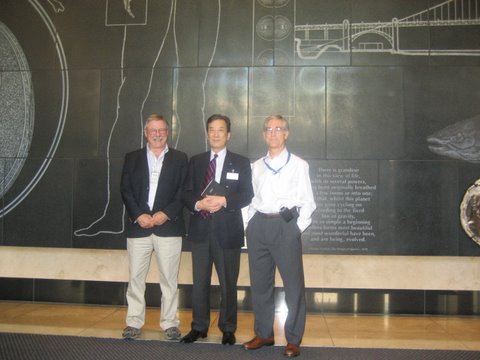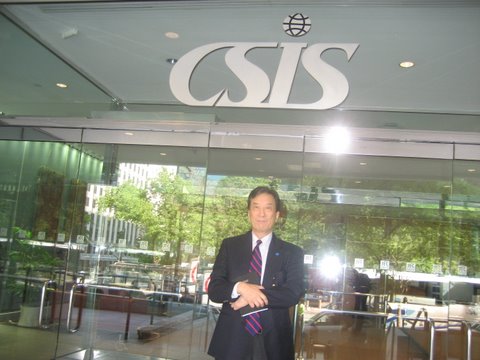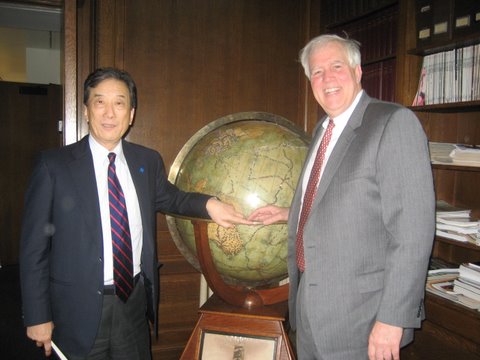→Japanese
I left for Washington DC on May 9th (Mon), right after the ‘Golden Week’ holidays. Arrived at 2pm on the same date, checked in to the hotel, took a brief rest, and headed to the Carnegie Institution of Science to see Dr Richard Meserve (Ref.1), a long time friend. Dr. Meserve is also one of the key persons of the nuclear power plant policies of the United States, so I came to see him to discuss issues related to the Fukushima nuclear plant. I understand that Mr Fujita (in Japanese), member of the House of Councillors, visited him just recently, too.
After the visit which was for about 40minutes, I went on to CSIS. Here, my purpose was to discuss with them the progress of the project with our HGPI (Ref.1), which I have reported to you earlier, (click here for the video), as well as to discuss how we could collaborate on the “Japan’s Recovery Plan After ‘3.11’” by CSIS announced on April 20th.
After having a discussion for about an hour, I went to the National Academies of Sciences. Here, my focus was to exchange views with experts of the Science Academies on nuclear power/radiation and international relations; Drs Michael Clegg (Foreign Secretary), John Boright (Executive Director, International Affairs), Kevin Crowley (Senior Board Director, Nuclear and Radiation Studies Board), Richard Bissell (Executive Director, Policy and Global Affairs Division) joined. I have been in touch with both Michael Clegg and John Boright for about a decade or so, from the time when the scientists started to be active in presenting policy recommendation for the global age, when I was serving as the vice president and later the president of the Science Council of Japan; and of course in the last two months on Fukushima.
They had understood well about the purpose of my visit, and it helped much in having a very constructive discussion. It is very important, especially at time of crises, that you have such good personal relationship with mutual trust with experts of the world.
I do understand that there are many hurdles, but we must be aware that the Fukushima Nuclear Power Plant issue is not only in itself a great issue to the world, but how Japan handles this and all of the other problems that stem from it – such as risk management policies and their deployments, the effects of radiation on health, environment, agricultural or industrial products, or emission of radiology to the ocean – the entire response of Japan as a whole is being watched by the world. When unpredictable crisis issues arise, the way the nation reacts and handles is a test and determines, like it or not, the most fundamental credibility of that nation.
In such circumstance, setting an independent commission consisting of international experts is a crucial, very important political process in securing the credibility of a nation today.
Look, for instance, at the BSE problem in Great Britain that started in the 1980s. It took nearly 20 years for them to regain trust, even after they referred and acted to the independent EU committee and waited for their conclusions.
As the world goes global, international credibility/mutual trusts of nations is becoming increasingly important, and in this context how Japanese government reacts to the nuclear power plant issues, how it keeps the process of treatments/decision makings open, transparent, subjective is evermore crucial. However, I regret to say that the government, companies, media, and the scientific community of Japan failed to recognize this at all. Therefore, it seems to me that they are unable to make any trustworthy, speedy actions or decisions and focusing instead on domestic circumstance, making policies that are too nearsighted. The world at large recognizes somehow not-so-appropriate responses of Japanese leadership, which underlies, in my view, a quick decline of the reputation of Japan and spreading of unfavorable rumors or misinformation that harm the Japanese products and industries.
Next morning from 7am, I had a breakfast with Ambassador Fujisaki, and then spent the rest of the day having discussion with 10 or so of experts of an Aging Society Think Tank. At lunch time I enjoyed a short but nice conversation with Dr John Howe, President of Project Hope, who just arrived at Dulles Airport from Johannesburg, and Drs Darrel Porr and Frederic Gerber (Dr. Gerber also came directly from Johannesburg) who was with us in Japan just last week, thanks to the thoughtful arrangement of HE Fujisaki.
After the lunch, I returned to continue discussion and made my presentation, then at 5pm, just before the closing, left for the Dulles Airport to fly to Zurich via London where I will head for St Gallen.
My visit to Washington DC was only for about 30 hours, tightly packed schedule, but it turned out to be an extraordinarily fulfilling stay. I thank Ambassador Fujisaki and his staff at the Japan Embassy in Washington DC, and many others for their kind and wonderful support.
I hope this trip will be of some help to the current situation of Japan…..




